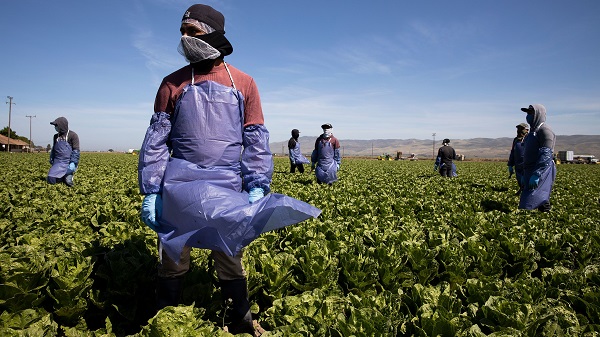Farm Worker Jobs In USA With Visa Sponsorship – In the United States, there are many job opportunities available for people who want to work on farms. These jobs are known as “farm worker jobs.” What makes these jobs even more appealing is the possibility of getting a visa sponsorship, which can help you come to the U.S. and legally work on a farm.
Visa sponsorship means that a U.S. employer is willing to support and hire workers from other countries. They help these workers obtain the necessary visas, which are documents that allow them to live and work in the U.S. temporarily.
Working on a farm in the U.S. can be a great opportunity for people who enjoy outdoor work, have a passion for agriculture, or simply want to experience life in a different country.
This post will explore farm worker jobs in USA with visa sponsorship in more detail, including what these jobs entail, the benefits of visa sponsorship, and how to go about finding such opportunities. So, if you’re interested in learning about working on farms in the U.S. with visa sponsorship, keep reading!
Types Of Farm Worker Jobs In USA
Farm work in USA encompasses a wide range of jobs, from planting and harvesting crops to taking care of livestock and maintaining farm equipment. Here are some common types of farm worker jobs in USA:
1. Crop Farm Workers:
- Farm Laborers: These workers perform various tasks such as planting seeds, weeding, irrigating, and harvesting crops like fruits, vegetables, grains, and nuts.
- Harvesters: Specifically focused on the timely and efficient harvesting of crops.
- Tractor Operators: Operate tractors and other machinery for tasks like plowing, tilling, and planting.
2. Livestock Farm Workers:
- Ranch Hands: Responsible for the care and management of livestock, including feeding, herding, and providing medical attention when necessary.
- Dairy Workers: Involved in milking cows, maintaining dairy equipment, and ensuring the overall well-being of dairy cattle.
- Poultry Workers: Work in poultry farms, taking care of chickens, turkeys, or ducks for egg or meat production.
3. Farm Equipment Mechanics:
- Farm Equipment Mechanics and Technicians: Repair and maintain farm machinery, such as tractors, combines, and irrigation systems.
4. Farm Managers:
- Farm Managers or Supervisors: Oversee day-to-day operations on the farm, including planning, budgeting, and coordinating the work of other farm workers.
5. Agronomists and Crop Consultants:
- Agronomists: Provide expertise on crop management, soil health, and pest control to optimize crop yields.
- Crop Consultants: Offer advice to farmers on crop selection and management practices.
6. Farm Labor Contractors:
- Contract Laborers: Provide temporary farm labor to assist with planting, harvesting, and other seasonal tasks. They often hire and manage a team of workers for specific projects.
7. Irrigation Technicians:
- Irrigation Workers: Install, maintain, and repair irrigation systems to ensure crops receive adequate water.
8. Greenhouse Workers:
Greenhouse Laborers: Tend to plants in greenhouse environments, controlling temperature, humidity, and light to promote plant growth.
9. Beekeepers:
- Apiarists: Manage beehives and bee colonies for honey production and pollination services.
10. Aquaculture Workers:
- Aquaculturists: Work in fish farms, managing the breeding, feeding, and harvesting of aquatic species such as fish and shrimp.
11. Farm Educators:
- Agricultural Educators: Teach agricultural techniques and practices to students and community members interested in farming and agriculture.
12. Farm Market Workers:
- Farm Market Managers: Operate and manage farmers’ markets, where they sell farm products directly to consumers.
13. Research and Extension Specialists:
- Agricultural Scientists: Conduct research on farming practices, crop development, and animal husbandry, and provide extension services to farmers.
Types Of Visas To Apply For When Seeking Farm Worker Jobs In USA With Visa Sponsorship
If you’re seeking farm worker jobs in USA with visa sponsorship, there are several types of visas that may be applicable depending on your specific situation and qualifications. Here are some common visa options:
1. H-2A Temporary Agricultural Worker Visa:
The H-2A visa is designed for temporary agricultural workers. To qualify for this visa, your employer must demonstrate that they cannot find enough qualified U.S. workers to fill the positions and that hiring foreign workers is necessary.
You must be offered a job in the agricultural sector that is temporary or seasonal in nature.
Your employer must provide you with transportation to the United States, housing, and a certain level of wages as set by the Department of Labor.
2. J-1 Exchange Visitor Visa (Agricultural Trainee):
The J-1 visa is for individuals who wish to participate in an agricultural training program in USA. It allows you to gain practical experience and skills in the agricultural field.
To be eligible for the J-1 agricultural trainee program, you typically need to be sponsored by an approved exchange program sponsor and meet certain educational and skill requirements.
3. B-1 Business Visitor Visa:
In some cases, individuals may enter the United States on a B-1 visa for short-term agricultural-related business activities, such as attending meetings, negotiating contracts, or conducting research. However, you cannot engage in actual farm work on a B-1 visa.
4. E-3 Visa (for Australian Citizens):
If you are an Australian citizen, you may be eligible for the E-3 visa, which is similar to the H-1B visa but specific to Australian nationals. Some agricultural positions may be eligible under this visa category if they meet the required criteria.
5. TN Visa (for Canadian and Mexican Citizens):
Canadian and Mexican citizens can apply for a TN (Trade NAFTA) visa if they have a job offer in certain agricultural occupations listed in the NAFTA agreement. This can include roles such as agricultural economist, agronomist, or animal breeder, among others.
6. F-1 Student Visa with Optional Practical Training (OPT):
If you are an international student in the United States on an F-1 visa, you may be eligible for Optional Practical Training (OPT) after completing your studies. You can seek employment related to your field of study, including agriculture, during your OPT period.
Requirements To Apply For Farm Worker Jobs In USA With Visa Sponsorship
To apply for farm worker jobs in USA with visa sponsorship, you’ll need to meet certain requirements and go through a specific process. Here are the general steps and requirements:
1. Eligibility:
Be at least 18 years old.
Be physically fit and capable of performing manual labor in agricultural settings.
2. Visa Type:
Most farm worker jobs in USA are filled through the H-2A visa program for temporary agricultural workers. To be eligible for an H-2A visa, you need to have a job offer from a U.S. employer who is willing to sponsor you.
3. Job Offer:
You must have a valid job offer from a U.S. employer who is registered with the U.S. Department of Labor (DOL) and is approved to hire H-2A workers.
The job offer should specify the terms and conditions of employment, including the duration of the job, wages, housing, and transportation arrangements.
4. Labor Certification:
The employer must apply for a temporary labor certification from the DOL, demonstrating that there are not enough U.S. workers available and willing to fill the positions.
5. Visa Application Process:
Once the labor certification is approved, your employer will provide you with the necessary documents to apply for the H-2A visa.
You’ll need to complete the DS-160 online visa application, pay the visa application fee, and schedule an appointment at the U.S. embassy or consulate in your home country.
6. Attend Visa Interview:
Attend a visa interview at the U.S. embassy or consulate, where you’ll be required to provide biometrics and answer questions about your background and intended employment in USA.
7. Visa Approval:
If your visa is approved, you’ll receive it in your passport.
8. Travel to USA:
You can then travel to USA to begin your employment.
9. Compliance:
You must comply with the terms of your visa, including working only for the sponsoring employer and leaving the country when your employment ends.
Required Documents To Apply For farm worker Jobs In USA With Visa Sponsorship
When applying for farm worker jobs in USA with visa sponsorship, it’s essential to ensure that you have all the required documents in order to maximize your chances of success. The United States offers various visa programs for agricultural workers, with the H-2A visa being the most common for temporary agricultural employment.
Here is a list of the essential documents you’ll need to apply for farm worker jobs in USA with visa sponsorship:
1. Valid Passport:
Ensure that your passport is valid for at least six months beyond your intended stay in the United States. If necessary, renew your passport before applying for a visa.
2. Employment Offer:
You must have a job offer from a U.S. employer who is willing to sponsor your visa. This offer should include details such as your job description, wage rate, and the duration of your employment.
3. H-2A Visa Application (Form DS-160):
This is the standard application form for most U.S. visas. You can fill it out online through the Consular Electronic Application Center (CEAC).
4. Labor Certification:
Your U.S. employer must obtain a labor certification from the U.S. Department of Labor (DOL) to demonstrate that they were unable to find suitable American workers for the job. This is a crucial step in the H-2A visa process.
5. H-2A Visa Petition (Form I-129):
Your employer must file this form with the U.S. Citizenship and Immigration Services (USCIS) to request permission to hire you as a temporary agricultural worker.
6. Notice of Approval (Form I-797):
If your H-2A visa petition is approved, you will receive a Notice of Approval (Form I-797) from USCIS. You’ll need this document to proceed with your visa application.
7. Visa Application Fee Receipt:
Pay the non-refundable visa application fee and keep the receipt as proof of payment. The fee amount can change, so be sure to check the latest information on the U.S. Department of State’s website.
8. Visa Interview Appointment Confirmation:
Once you’ve paid the visa fee, schedule an interview appointment at the nearest U.S. embassy or consulate. You’ll need the appointment confirmation to attend the interview.
9. Passport-sized Photos:
You may be required to submit passport-sized photos as per the specifications provided by the U.S. embassy or consulate.
10. Visa Sponsorship Letter:
Your U.S. employer should provide you with a letter confirming your job offer and sponsorship. This letter should include details about your position, wages, and the terms of your employment.
11. Proof of Ties to Your Home Country:
To demonstrate that you intend to return to your home country after your temporary work in USA, you can provide evidence such as property ownership, family ties, or other significant connections.
12. Medical Examination:
Some visa applicants may be required to undergo a medical examination by an approved panel physician to ensure that they meet health requirements.
13. Police Clearance Certificate:
Depending on your country of origin, you might need to provide a police clearance certificate or a certificate of no criminal record.
14. Proof of Funds:
It may be necessary to demonstrate that you have enough funds to cover your travel and living expenses in the United States until you receive your first paycheck.
15. Any Additional Documents Requested:
The U.S. embassy or consulate may request additional documents based on your individual circumstances, so it’s crucial to check their specific requirements.
How To Apply For farmworker Jobs In USA With Visa Sponsorship
Are you looking to explore job opportunities as a farmworker in the United States with the added benefit of visa sponsorship? Working on American farms can be a rewarding experience, and many employers are willing to sponsor visas for qualified candidates.
We will walk you through the steps to apply for farmworker jobs in USA with visa sponsorship, ensuring you are well-prepared for the application process.
1. Understand Visa Options:
Before you begin your job search, it’s crucial to familiarize yourself with the visa options available for foreign farmworkers in USA. The most common visa for this purpose is the H-2A visa, which is designed for temporary agricultural workers. To be eligible, employers must demonstrate a need for foreign labor, and you must meet specific qualifications and requirements.
2. Prepare Necessary Documents:
To apply for farmworker jobs with visa sponsorship, you’ll need to gather essential documents, including:
- Valid passport.
- Proof of eligibility for the H-2A visa.
- A job offer or contract from a U.S. employer.
- Proof of your qualifications and experience as a farmworker.
- Any required certifications or licenses.
3. Search for Job Openings:
Start your job search by exploring various platforms and resources, such as job websites, agricultural associations, and farm labor contractors. Look for job listings that explicitly mention visa sponsorship for foreign workers. Using the keywords “farmworker jobs in USA with visa sponsorship” in your online searches can help you find relevant openings.
4. Tailor Your Resume:
Craft a resume that highlights your relevant skills, experience, and qualifications as a farmworker. Emphasize any certifications or training you have received, as well as your willingness to relocate and work in USA. Make sure your resume is up to date and showcases your abilities as a valuable asset to potential employers.
Apply and Interview:
Submit your resume and any required documents to the employers offering farmworker positions with visa sponsorship. Be prepared for interviews, which may be conducted via phone or video calls. During interviews, emphasize your commitment to the job and your ability to meet the specific needs of the farm.
5. Secure Visa Sponsorship:
If an employer expresses interest in hiring you, they will initiate the H-2A visa sponsorship process. This typically involves filing paperwork with the United States Citizenship and Immigration Services (USCIS) and the Department of Labor. Your prospective employer will guide you through this process.
6. Prepare for Arrival:
Once your visa is approved, make arrangements for your travel to USA. Ensure you have all necessary documents and information for your entry, including your visa, passport, and employment contract.
Top States for Farm Worker Employment in USA
Farm worker employment in the United States can vary depending on the agricultural activity and the time of year, as some states are more conducive to certain types of farming than others. The following states are known for their significant farm worker employment opportunities:
1. California:
California is the largest agricultural state in the U.S. and employs a substantial number of farm workers throughout the year. It produces a wide variety of crops, including fruits, vegetables, nuts, and wine grapes.
2. Florida:
Florida is known for its citrus fruit production, especially oranges, and also has a significant number of farm workers involved in vegetable farming and other crops.
3. Texas:
Texas has a diverse agricultural industry, with a focus on cattle ranching, cotton, and other crops. Farm worker employment is substantial, particularly in regions like the Rio Grande Valley and the Texas Panhandle.
4. Washington:
Washington is a major producer of apples, cherries, and other tree fruits. It also has a growing wine grape industry, leading to employment opportunities for farm workers, particularly during harvest seasons.
5. North Carolina:
North Carolina is known for its tobacco production, poultry farming, and sweet potato production. It offers farm worker employment opportunities in various agricultural sectors.
6. Arizona:
Arizona’s warm climate is suitable for growing crops such as cotton, citrus fruits, and vegetables. This state provides employment for farm workers in these sectors.
7. Oregon:
Oregon has a thriving berry industry, particularly in blueberries, raspberries, and strawberries. It also produces a variety of other crops and provides employment for farm workers, especially during the harvest season.
8. Georgia:
Georgia is a major producer of peanuts, poultry, and various fruits and vegetables. It offers employment opportunities for farm workers in these sectors.
9. Michigan:
Michigan’s agricultural industry includes the production of apples, cherries, blueberries, and other fruits, as well as dairy farming. Farm workers are essential during the growing and harvesting seasons.
10. Idaho:
Idaho is known for its potato production, and it also produces a range of other crops such as sugar beets and wheat. Farm worker employment is significant in the state’s agricultural sector.
Challenges and Opportunities for Farm Workers in USA
Farm workers in USA face a range of challenges and opportunities, influenced by factors such as immigration status, labor laws, technological advancements, and market demands. Here are some key points to consider:
Challenges for Farm Workers:
Low Wages: Many farm workers, especially those who are undocumented, often earn low wages, which can make it difficult to support themselves and their families.
Unsafe Working Conditions: Farm work can be physically demanding and hazardous. Exposure to pesticides, extreme weather, and heavy machinery can pose risks to farm workers’ health and safety.
Lack of Labor Rights: Some farm workers, particularly those in small farms, may not have the same labor rights and protections as workers in other industries. This can lead to exploitation and abuse.
Healthcare Access: Access to healthcare can be limited for farm workers, which is especially concerning given the nature of the work and potential exposure to agricultural chemicals.
Seasonal Employment: Many farm jobs are seasonal, leading to income instability and job insecurity for workers.
Housing Issues: Farm workers often face inadequate and overcrowded housing conditions, which can lead to poor living conditions and health risks.
Language and Cultural Barriers: Language barriers can be a significant challenge for immigrant farm workers, making it difficult to communicate with employers and access necessary services.
Opportunities for Farm Workers:
- Immigration Reform: Comprehensive immigration reform could provide a path to legal status for undocumented farm workers, improving their working conditions and rights.
- Labor Advocacy: Organizations and unions are working to improve farm workers’ rights and working conditions, advocating for fair wages, safe working environments, and access to healthcare.
- Education and Training: Educational programs and training initiatives can help farm workers acquire new skills and advance in their careers, potentially moving into higher-paying positions within the agricultural sector.
- Technology Adoption: Advances in agricultural technology, such as automation and precision farming, can create opportunities for farm workers to learn new skills and become more efficient, potentially increasing their wages.
- Market Demand for Organic and Local Produce: The growing demand for organic and locally sourced produce can create opportunities for farm workers in these sectors, as they may command higher prices for their products.
- Access to Social Services: Initiatives aimed at improving access to social services, healthcare, and affordable housing for farm workers can enhance their quality of life.
- Community Support: Community organizations and non-profits often provide support, advocacy, and resources for farm workers, helping to address some of the challenges they face.
Interview Questions On Farm Worker Jobs In USA With Visa Sponsorship
- Can you tell us about your previous experience working on a farm or in a similar agricultural setting?
- What motivated you to apply for a farm worker job in USA, and why are you interested in visa sponsorship?
- Are you comfortable with physical labor and working outdoors in various weather conditions?
- Do you have any specific skills or certifications relevant to farm work, such as operating machinery or handling livestock?
- Are you familiar with the types of crops or animals typically raised on farms in USA?
- Can you describe a challenging situation you’ve faced in a previous farm job and how you resolved it?
- How do you prioritize safety when working on a farm, especially when using equipment or handling chemicals?
- Do you have any knowledge of sustainable or organic farming practices?
- Are you willing and able to work long hours, including weekends and holidays, during busy farming seasons?
- Are you comfortable working as part of a team and taking direction from supervisors or farm managers?
- Do you have any dietary restrictions or allergies that might affect your ability to work on a farm?
- Are you legally eligible to work in USA and willing to comply with all visa and immigration requirements?
- Can you provide references from previous employers or colleagues who can speak to your work ethic and reliability?
- How do you handle repetitive or physically demanding tasks without losing motivation or productivity?
- Are you adaptable and open to learning new farming techniques or technologies that may be used on the farm?
Final Note
Finding farmworker jobs in USA with visa sponsorship may take time and effort, but with the right preparation and determination, you can secure a valuable opportunity to work in American agriculture.
By following the steps outlined in this guide and using the appropriate keywords in your job search, you can increase your chances of finding a suitable job and embarking on a fulfilling career in the United States.
Remember that visa requirements can change, so always refer to the U.S. Department of State’s official website or consult with the U.S. embassy or consulate in your country for the most up-to-date information and guidance on applying for farm worker jobs in USA with visa sponsorship.
Goodluck!!






